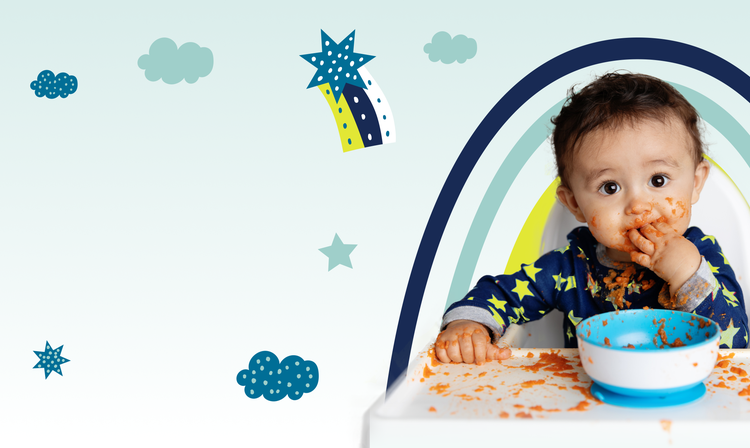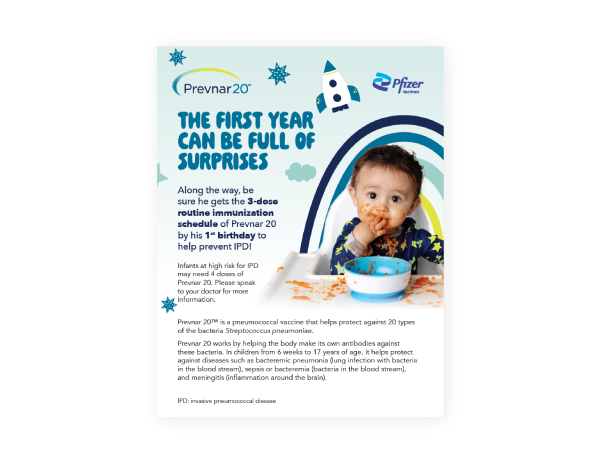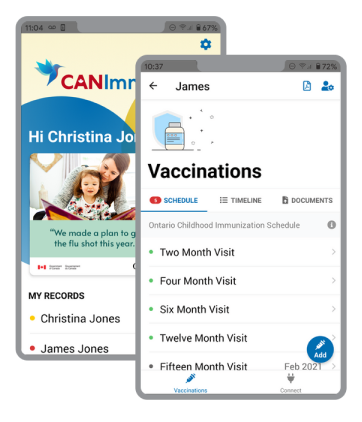THE FIRST YEAR can be FULL OF SURPRISES
Along the way, be sure they get the 3‑dose routine immunization schedule of Prevnar 20 by their 1st birthday to help prevent IPD!
Infants at high risk for IPD may need 4 doses of Prevnar 20. Please speak to your doctor for more information.
IPD: invasive pneumococcal disease.


THE FIRST YEAR can be FULL OF SURPRISES
Help ensure that your baby receives the full dosing schedule of Prevnar 20.


THE FIRST YEAR can be FULL OF SURPRISES
Recommended by Canada’s National Advisory Committee on Immunization (NACI).


Prevnar 20TM is a pneumococcal vaccine that helps protect against 20 types of the bacteria Streptococcus pneumoniae.
Prevnar 20 works by helping the body make its own antibodies against these bacteria. In children from 6 weeks to 17 years of age, it helps protect against diseases such as bacteremic pneumonia (lung infection with bacteria in the blood stream), sepsis or bacteremia (bacteria in the blood stream), and meningitis (inflammation around the brain).
Ensure your baby gets the full dosing schedule of Prevnar 20
3 reasons why it’s important that your baby gets the complete dosing schedule of Prevnar 20
Why Prevnar 20?
The National Advisory Committee on Immunization recommends Pneu-C-20 (Prevnar 20) for routine infant immunization schedule of healthy infants for protection against IPD due to serotypes contained in the vaccine
Prevnar 20 is a pneumococcal vaccine
used for the prevention of diseases such as bacteremic pneumonia, sepsis, and meningitis caused by 20 types of the bacteria Streptococcus pneumoniae. It’s administered into the arm or leg muscle.
Prevnar 20 works by helping the body create antibodies
to recognize and respond to harmful bacteria. That way, the immune system can remember and fight against disease if the harmful bacteria attacks in the future. Prevnar 20 helps your baby’s body make its own antibodies, which protects against diseases caused by 20 types of the bacteria Streptococcus pneumoniae.
Vaccines from the Prevnar franchise have been available to Canadian babies for 22+ years
- Prevnar – since 2001
- Prevnar 13 – since 2009
- Prevnar 20 – since 2023
Prevnar (Pneumococcal 7-valent Conjugate Vaccine) is no longer marketed in Canada.
IPD infections caused by Streptococcus pneumoniae can be life-threatening
TAP AN ICON to learn about the infection linked to that area of the body.
Bacteremic pneumonia
Bacteremic pneumonia
(lung infection with bacteria in the bloodstream)
Symptoms
- Fever and chills
- Cough
- Rapid breathing or difficulty breathing
- Chest pain
Complications
- Infection of the space between membranes that surround the lungs and chest cavity (empyema)
- Inflammation of the sac surrounding the heart (pericarditis)
- Blockage of the airway that allows air into the lungs (endobronchial obstruction)
- Lung collapse (atelectasis)
- Collection of pus (abscess) in the lungs
Sepsis
Sepsis
(bacteria in the bloodstream)
Considered a medical emergency
Symptoms
- Fever
- Chills
- Low alertness
- Clammy or sweaty skin
Complications
- Rapid deterioration of tissue health and organ function
- About 1 in 30 children with pneumococcal bacteremia (bacteria in the bloodstream) will die from it.
Meningitis
Meningitis
(inflammation around the brain)
Symptoms
- Stiff neck
- Fever and headache
- Pain when looking into bright lights
- Confusion
- Poor eating and drinking; vomiting
- Low alertness
Complications
- About 1 out of 12 children will die from the infection. Those who survive may have long-term problems, such as hearing loss or developmental delay.
Prevnar 20 is not indicated to reduce complications of IPD, including death, neurological complications, hearing loss, or developmental delays.
How is IPD treated?
IPD can be treated with antibiotics.
Although Prevnar 20 can help protect against diseases such as bacteremic pneumonia, sepsis or bacteremia, and meningitis caused by 20 types of the bacteria Streptococcus pneumoniae, it is not intended to be used in the treatment of active infection.
As with any vaccine, Prevnar 20 will not protect 100% of those who receive the vaccine.
Prevnar 20 is not indicated to reduce complications of IPD, including death, neurological complications, hearing loss or developmental delays.
Who is at risk?
Babies and the elderly are the age groups that most commonly get IPD caused by the bacteria Streptococcus pneumoniae.
Children under 5 years of age in child care settings are at greater risk of IPD infection, because they are more likely to share items they usually put in their mouths, such as toys, with other children.
Recommended Resources

Patient information brochure
With the help of this parent- and caregiver-focused brochure, discover Prevnar 20, the dosage schedule for your child, and the risks and benefits of the vaccination.

Immunize Canada
Immunize Canada provides Canadians, including healthcare consumers and providers, with credible and reliable information on immunizations for all ages.
Capture every moment! Babies grow up so fast!

Capture your baby’s milestones and learn about their incredible abilities as they grow with your own set of milestone cards that you can print at home!
Frequently asked questions
A healthcare professional will inject the recommended dose (0.5 mL) of the vaccine into your child’s upper arm or thigh muscle.
If you have any further questions on the use of Prevnar 20, ask your healthcare professional.
Children and adolescents previously vaccinated with Prevnar 13 may receive a single catch-up dose of Prevnar 20.
Talk to your baby’s healthcare professional to determine when they should be receiving their Prevnar 20 dose.
Your baby can be considered for Prevnar 20 at the same time as the following routine childhood vaccinations: diphtheria, tetanus, acellular pertussis hepatitis B virus, poliovirus, Haemophilus influenzae type b, measles, mumps, rubella, varicella, rotavirus, and the influenza virus.
Talk to your baby’s healthcare professional if you have any concerns.
Prevnar 20 safety information
Prevnar 20 should not be used if your child is allergic (hypersensitive) to the active substances, to any other ingredients, or to any other vaccine that contains diphtheria toxoid.
Take special care with Prevnar 20:
- If your child has any present or past medical problems after any dose of Prevnar 20, Prevnar 13, or Prevnar, such as an allergic reaction or problems with breathing
- If your child has a severe illness or high fever—however, a mild fever or having a cold is not a reason to delay vaccination
- If your child has any bleeding problems or bruises easily
- If your child has a weakened immune system due to a medical condition or is on a medicine that affects their immune system, because your child may not get the full benefits from Prevnar 20
Prevnar 20 will only protect against diseases caused by the types of Streptococcus pneumoniae covered by the vaccine. As with any vaccine, Prevnar 20 will not protect 100% of those who receive the vaccine.
Following vaccination with Prevnar 20, children and adolescents may experience decreased appetite, irritability, feeling sleepy, fever, redness/swelling/hardness/pain or tenderness at the injection site, diarrhea, vomiting, and rash.
Talk to your doctor, nurse, or pharmacist about vaccination with Prevnar 20.
